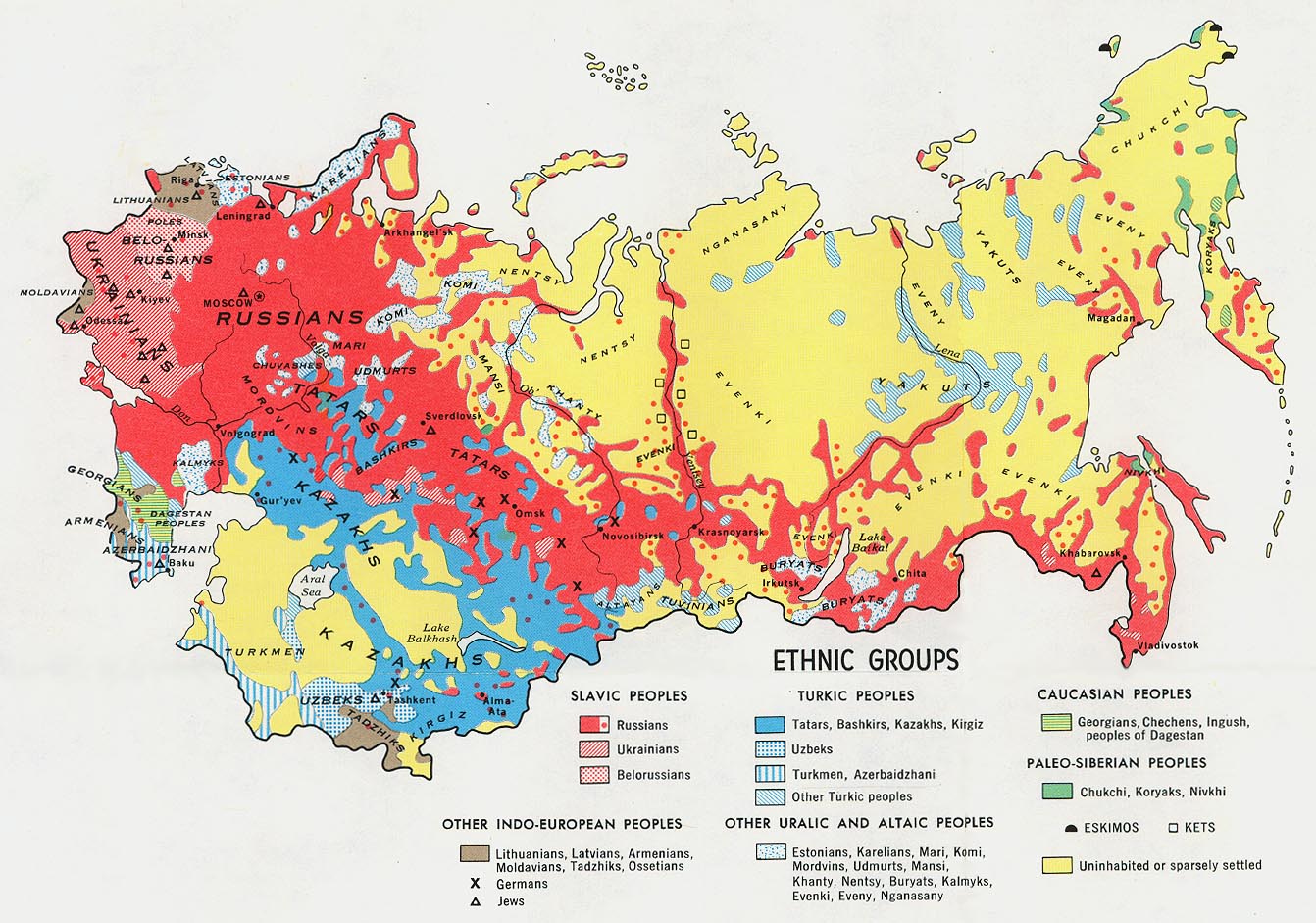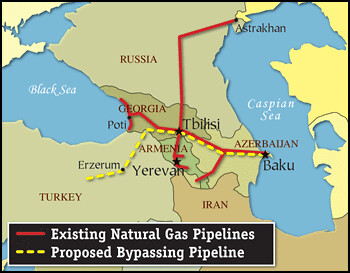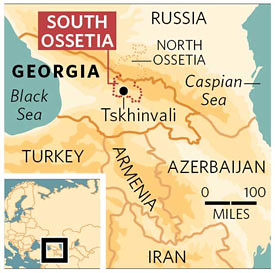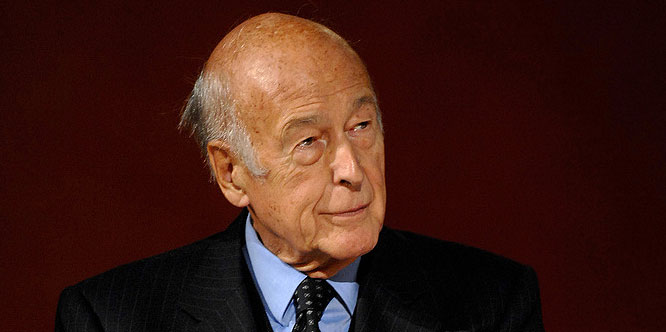 Yesterday’s Observer was on really rather good form, with a decent long article amply demonstrating the human cost – easy to forget when trying to work out the wider geopolitical remifications:
Yesterday’s Observer was on really rather good form, with a decent long article amply demonstrating the human cost – easy to forget when trying to work out the wider geopolitical remifications:
“They sifted out villagers with Georgian surnames, immediately executing all teenage boys. Nugzari Jashashvili, 65, was returning home across the fields when he saw gunmen approach the house of his neighbour, Gela Chikladze, 50. ‘They cut his throat,’ Jashashvili said.”
I’m focussing on the politics, but that’s not to say that this is just an interesting intellectual exercise in trying to predict the future of Eurasian relations. People have been killed in untold numbers in Georgia and South Ossetia, both by the Georgian and Russian armies and by bands of roving maniacs with guns, loosely fighting in what they see as the interest of one side or the other. There has been ethnic cleansing. People continue to die. The death toll may be unknown, but it is in the thousands.
Further on, a good think piece from Neil Acherson, and a moderately sensible editorial that makes a couple of interesting arguments:
“One crucial difference between the current East-West confrontation and the Cold War is that, this time, the economic ties binding the two sides are stronger. Russia needs access to Western markets; the West – and Europe in particular – needs Russian oil and gas. That creates an opportunity for the European Union, the world’s largest single market, to play a moderating role, steering the conversation away from military grandstanding and towards economic negotiation…
“Such aggression must not be rewarded. But Cold War-style brinkmanship will not make Russia’s neighbours safer. It will only reinforce the Kremlin’s view that small states are pawns in a strategic game. The best guarantee of security and peace in Europe since the end of the Cold War has been economic integration, achieved through the EU. It is Brussels, not Washington, that stands the best chance of persuading Moscow to change its ways.”
Today this is followed up by a piece on Comment is Free by Lib Dem MEP Graham Watson, again making the case for the EU as peacebroker:
“Europe is the only player that can be seen as an honest broker… Europe’s initial ambivalence might prove the unlikely key to its success. Post-Soviet member states are more inclined to lay blame for the conflict at Russia’s door; others, including Italy, have expressed an opposing view. By acknowledging that there are different opinions over responsibility for this conflict, the EU can better adopt a position of neutrality in its negotiations.”
Yes, Watson may be partisan, but I can’t do anything other than agree 100% with him on this:
Playing to the gallery of populist opinion is short-sighted but inevitable at this point in America’s election cycle. But not all EU member states have resisted that temptation either. Notably, Britain’s foreign secretary, David Miliband, and the Conservative leader, David Cameron, have engaged in a race to the bottom with each determined to use tougher, more anti-Russian rhetoric than the other. It is an unedifying spectacle that proves their mutual lack of suitability for the job that they are really squabbling over.
For reasons best known to himself, Miliband has been baiting Moscow for months in a series of vaguely populist soundbytes that have been highly critical of the Kremlin, further escalating the ongoing UK/Russia tensions that have been on the up since before the Litvinenko affair. Cameron… Well, what to make of Cameron? Thus far he’s rarely bothered making much of an effort when it comes to foreign affairs, far happier to score easy points at home. But his Tbilisi trip – coming as it has after the overly-extended decision to pull the Tory MEPs out of the EPP group (against their will) and his half-hearted attempt to build an alliance with the Czech Republic to push EU reform down an ill-defined new path – has nudged me right to the brink of declaring Cameron a man with no sense of the realities of international relations and foreign diplomacy.
Hell, with people like Cameron and Miliband potentially in charge of the UK’s foreign policy, I say bring on an EU-based common foreign policy as soon as possible. When it comes to The Great Game, we can’t risk having second-rate minds with no concept of history at the helm. Why are we still allowing Cameron and Miliband to go around kicking the hornet’s nest when a collective effort is so vital? Because just as it is not in the EU’s interest to alienate Russia thanks to Moscow’s control of so many vital energy supplies, it is not in Britain‘s either. Come on – this is Britain we’re talking about. We used to be good at this stuff. We didn’t get such a vast Empire by making stupid statements and shaking our fists at people – we got it through a combination of overwhelming military force and backed up with insanely good intelligence and expert diplomacy. We no longer have the overwhelming military force – which makes diplomacy and intelligence all the more vital. Miliband and Cameron, in their Georgia statements, appear to possess neither.
And now for a question, the answer to which I genuinely can’t work out. Considering that the Council of Europe exists to promote democracy, justice and the rule of law, contains all EU member states, plus every other European state with an interest in this affair – Turkey, Ukraine, Azerbaijan, Armenia – and, most importantly, both Russia and Georgia, why isn’t it the CoE rather than the EU that is taking the lead here?


 That’s meant to discourage eastern European countries – all of whom have less then pleasant memories of armies from Russia invading, looting, raping, pillaging and occupying them for the last several centuries – from looking to NATO for help and signing up to the proposed US missile defence shield how, exactly?
That’s meant to discourage eastern European countries – all of whom have less then pleasant memories of armies from Russia invading, looting, raping, pillaging and occupying them for the last several centuries – from looking to NATO for help and signing up to the proposed US missile defence shield how, exactly?
 So it seems that Georgia just
So it seems that Georgia just  The map to the left may indicate why. And yes this is all part of my slowly developing geopolitics of European energy supply theory of relations between Russia and the west (see also theories about
The map to the left may indicate why. And yes this is all part of my slowly developing geopolitics of European energy supply theory of relations between Russia and the west (see also theories about  The recent military action has already
The recent military action has already  For more on Nabucco’s significance, check out
For more on Nabucco’s significance, check out  And so it should all begin to come clear. The West wants Georgia for its strategic value as one of the links in the Caucasian energy chain – the only route from Central Asia to Europe that doesn’t involve passing through less than reliable countries like Russia or Iran. The only supply route for non-European natural gas that will not be under Russian control (as can be seen in the map to the left) – and a direct competitor to Russia’s own planned
And so it should all begin to come clear. The West wants Georgia for its strategic value as one of the links in the Caucasian energy chain – the only route from Central Asia to Europe that doesn’t involve passing through less than reliable countries like Russia or Iran. The only supply route for non-European natural gas that will not be under Russian control (as can be seen in the map to the left) – and a direct competitor to Russia’s own planned 
 I was going to write about this yesterday, because in these days of vastly diminished foreign news staff on national newspapers, the fact that a story about the breakaway Georgian
I was going to write about this yesterday, because in these days of vastly diminished foreign news staff on national newspapers, the fact that a story about the breakaway Georgian  So then, nutty eurosceptic types who blamed the so-called
So then, nutty eurosceptic types who blamed the so-called 